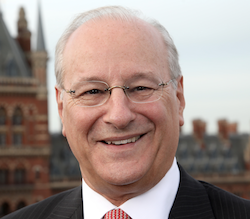 Openreach has increased its efforts to drive Britain’s digital revolution with a plan to invest more than ever in its network and work closer with industry bodies and stakeholders, says Chairman Mike McTighe.
Openreach has increased its efforts to drive Britain’s digital revolution with a plan to invest more than ever in its network and work closer with industry bodies and stakeholders, says Chairman Mike McTighe.
The infrastructure builder, which last year spent more than £1.5 billion on its network, has bigger spending plans as it seeks to underpin Digital Britain. “This year we’ll invest more than any prior year,” stated McTighe. “It’s been a busy time, simultaneously laying the foundations for Britain’s ultrafast future, setting more ambitious targets for rolling out FTTP and investing in a better and broader network. We believe in a full fibre future, so we need to develop a viable business case that makes that possible.”
The moves come after efforts to reform Openreach following pressure on BT from the regulator which led to commitments made to Ofcom under its Digital Communications Review in 2017. That was seized as an opportunity by Openreach, said McTighe. “We’ve made big strides towards becoming a distinct, legally separate company within BT Group,” he added. “Openreach has its own board responsible for setting strategy and overseeing performance within a strategic and financial framework defined by BT. We’re tracking well against all of the commitments BT made as a result of the DCR and we’re ahead on many, including our governance and rebrand.”
Since the DCR, which also pressed for greater transparency of Openreach’s operations, trading figures have been made public for the company’s first year, showing that despite around £230 million of regulatory price changes it held revenue flat due to strong demand for fibre products. Operating costs were up one per cent, reflecting investment in delivering copper minimum service levels, halving missed appointments by the end of the financial year and upskilling its workforce. Capital expenditure was £1,573 million, up £126 million (nine per cent), the rise attributed to investment in fibre coverage and speed and the delivery of more complex Ethernet circuits. EBITDA decreased one per cent with operating profit down seven per cent.
“This year we continued to grow our superfast broadband network,” said McTighe. “Today it delivers speeds of at least 24 Mbps to almost 28 million premises. Few countries around the world can point to such a widespread superfast footprint. But everyone in Britain should be able to get decent broadband speeds and we’re still five per cent short of good enough.
“Furthermore, having achieved such widespread access to superfast broadband it’s right that we shift our focus to the next generation of ultrafast (100-plus Mbps) infrastructure. We’re in the process of restructuring Openreach to focus on a Fibre First ethos. We now have a Fibre First approach to every network expansion decision we make, and we’ve started work in eight major cities. I firmly believe that with the right conditions we can reach 10 million premises by the mid-2020s and the majority of the UK thereafter. We’ve also continued to develop technologies that will help us deliver ultrafast connectivity to people quickly and cost effectively.”
McTighe has plans to build the Gfast platform which will make ultrafast speeds available to millions of premises between now and the end of 2020. “The beauty of Gfast is that we can build it fast and we’ll be targeting areas that aren’t in our initial plan for FTTP, so more people will benefit,” he stated.
Openreach also set out to develop stronger relationships with customers through consultations on major strategic investments while forging closer ties with the industry, regulators and Government. “Having consulted our Communications Providers customers during the summer we now have an accelerated plan to make full fibre/FTTP connections available to three million homes and businesses by the end of 2020,” commented McTighe. “But we want to go a lot further, to 10 million premises and ultimately most of the UK if the business case is feasible.
“We’ve invested heavily in our people, training and systems, and we hired over 2,390 extra engineers to maintain our network and connect our customers throughout Britain. We’ll hire a further 3,000 this coming year in support of our Fibre First plans. And we’ve introduced new training and career opportunities to help us develop and keep hold of the best engineering talent.
“Moreover, we support the Government’s objective to deliver a Universal Service Obligation. I’m encouraged by the progress we’ve made this year in cutting the number of faults, keeping missed appointments to a minimum and fixing the faults we find much faster. But there’s more to do.”
Openreach fact file:
• Over 97,000 street cabinets and 4.8 million distribution points (telephone poles and junction boxes).
• Works with more than 600 ‘not-spot’ communities to deliver Community Fibre Partnerships.
• Halted and reversed a six year rise in network faults.
• Over the past ten years £11 billion has been invested in the Openreach network.
• Carries out 9.5 million engineering jobs each year, dealing with 25,000 customers every day.
• CP customer satisfaction grew by 3.8 per cent during the year.
